Unit 3 on line travel 教案
牛津英语8B_Unit3_Online_Travel_单元分析及课时教案
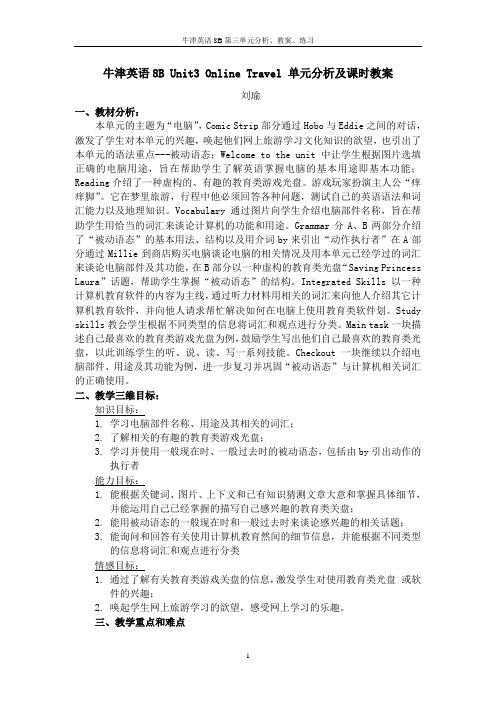
牛津英语8B Unit3 Online Travel 单元分析及课时教案刘瑜一、教材分析:本单元的主题为“电脑”,Comic Strip部分通过Hobo与Eddie之间的对话,激发了学生对本单元的兴趣,唤起他们网上旅游学习文化知识的欲望,也引出了本单元的语法重点---被动语态;Welcome to the unit 中让学生根据图片选填正确的电脑用途,旨在帮助学生了解英语掌握电脑的基本用途即基本功能;Reading介绍了一种虚构的、有趣的教育类游戏光盘。
游戏玩家扮演主人公“痒痒脚”。
它在梦里旅游,行程中他必须回答各种问题,测试自己的英语语法和词汇能力以及地理知识。
Vocabulary通过图片向学生介绍电脑部件名称,旨在帮助学生用恰当的词汇来谈论计算机的功能和用途。
Grammar分A、B两部分介绍了“被动语态”的基本用法、结构以及用介词by来引出“动作执行者”在A部分通过Millie到商店购买电脑谈论电脑的相关情况及用本单元已经学过的词汇来谈论电脑部件及其功能,在B部分以一种虚构的教育类光盘“Saving Princess Laura”话题,帮助学生掌握“被动语态”的结构。
Integrated Skills以一种计算机教育软件的内容为主线,通过听力材料用相关的词汇来向他人介绍其它计算机教育软件,并向他人请求帮忙解决如何在电脑上使用教育类软件划。
Study skills教会学生根据不同类型的信息将词汇和观点进行分类。
Main task一块描述自己最喜欢的教育类游戏光盘为例,鼓励学生写出他们自己最喜欢的教育类光盘,以此训练学生的听、说、读、写一系列技能。
Checkout 一块继续以介绍电脑部件、用途及其功能为例,进一步复习并巩固“被动语态”与计算机相关词汇的正确使用。
二、教学三维目标:知识目标:1.学习电脑部件名称、用途及其相关的词汇;2.了解相关的有趣的教育类游戏光盘;3.学习并使用一般现在时、一般过去时的被动语态,包括由by引出动作的执行者能力目标:1.能根据关键词、图片、上下文和已有知识猜测文章大意和掌握具体细节,并能运用自己已经掌握的描写自己感兴趣的教育类关盘;2.能用被动语态的一般现在时和一般过去时来谈论感兴趣的相关话题;3.能询问和回答有关使用计算机教育然间的细节信息,并能根据不同类型的信息将词汇和观点进行分类情感目标:1.通过了解有关教育类游戏关盘的信息,激发学生对使用教育类光盘或软件的兴趣;2.唤起学生网上旅游学习的欲望,感受网上学习的乐趣。
【范文】Unit 3 Online travel教学案

Unit 3 Online travel教学案Unit3onlinetravel教学案Unit3onlinetravelcomicstripandwelcometotheunit学习目标:词汇:课本P123(P40-P41)的单词词组:haveonidea,looklike,remotecontrol,turnon,changethec hannel,searchforinformation,sendandreceivee-mails,u sesth.todo…,writecomputerprogrammes,wordprocessing 知识点:.Iusuallyuseittosearchforinformation.searchforsth/searchsth的区别searchsb.oraplaceforsth2.Ihavenoidea.=Idon'tknow.havenoidea后面可以接of短语或从句。
3.Look,theTVisturnedonnow.turnon/turnoff/turndown/turnup4.whatdoyouusuallyuseyourcomputertodo?usesth.todo…Stepone:FinishthefollowingEx预习题同义句转换。
.I’mafraidI’venoidea.I’mafraidI_____________.2.Tomwillsay“yes”tome.Tomwill___________me.3.TheboyturnsontheTVnow.TheTV_____________________now.4.whatdoyouusethecomputerfor?whatdoyouusethecomputer_____________?5.Iusethecomputertosearchforinformation.Thecomputeris______________searchforinformation.StepTwo:QuestionsandDiscussionmakedialogues,thenfinishtheExP41AStepThree:FinishthefollowingEx当堂训练题(一)根据句意、首字母或汉语提示完成下列句子。
Unit 3 Online travel教学案
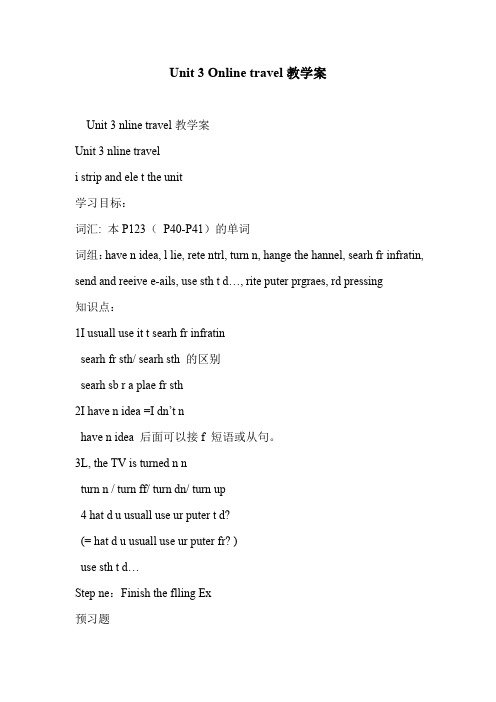
Unit 3 Online travel教学案Unit 3 nline travel教学案Unit 3 nline traveli strip and ele t the unit学习目标:词汇: 本P123(P40-P41)的单词词组:have n idea, l lie, rete ntrl, turn n, hange the hannel, searh fr infratin, send and reeive e-ails, use sth t d…, rite pu ter prgraes, rd pressing知识点:1I usuall use it t searh fr infratinsearh fr sth/ searh sth 的区别searh sb r a plae fr sth2I have n idea =I dn’t nhave n idea 后面可以接f 短语或从句。
3L, the TV is turned n nturn n / turn ff/ turn dn/ turn up4 hat d u usuall use ur puter t d?(= hat d u usuall use ur puter fr? )use sth t d…Step ne:Finish the flling Ex预习题(一)预习本内容,尝试写出下列短语。
1遥控器2看起像3打开电视4同意某人字处理6举行一次作比赛7收发电子邮8编写电脑程序9搜索信息10换频道(二) 同义句转换。
1 I’afraid I’ve n ideaI’afraid I ______ _______2 T ill sa “es” t eT ill ______ _____ e3 The b turns n the TV nThe TV _______ _______ _______ n4 hat d u use the puter fr?hat d u use the puter ______ _______?I use the puter t searh fr infratinThe puter is _______ _______ searh fr infratinStep T:Questins and Disussinae dialgues, then finish the Ex P41AStep Three:Finish the flling Ex当堂训练题(一)根据句意、首字母或汉语提示完成下列句子。
Unit 3 Online Travel教案 (译林牛津版英语七年级)

Comic strip and welcome to the unitBy Xu Xianggu1.Teaching aims and demands on knowledge and abilitiesa. To get to know the main topic of this unit ---computer.b. To learn to guess the meanings for each picture.c. To get to know the basic use of a computer and learn to talk about them.e. To gain a feeling of success through making up and acting out after the samples in English.f.To develop our students’ society sense2.Teaching focus:To leaen to talk about what to use a computer for.3.Teaching difficulty:To get to know the new grammar –passive voice4. The teaching methodsTeaching aids: multi-mediaTeaching methods: Communicative ApproachStudy strategies: autonomous learning; pair work & group cooperationPart Three Teaching procedures:ProcedureStep One GreetingsStep Two presenting1.I’ll show a picture of a computer and ask:What is this?Do you have one at home?What do you usually do in your free time ?Do you enjoy computer games ?2.Leading-in by askingDo you only use your computer to play games?What do you use your computer for?Why?How often do you use your computer to help your study or play games ?(Here encourage students to give opinions as many as possible andpresent the expressions such as drawing and designing , playing games, sending receiving e-mails)3.Show the pictures one by one and askDo you know any other uses of a computer?What does your father use a computer for?(According to each picture present the words and expressions such as word processing ,search for information, writing computer programs)4.Read them and try to make sentences with them.Step Three practice1. Check them on the words and phrases: Show the six pictures and ask them to give the computer use in English.2. Work in pairs with the expressions: What do you use your computer for?I use it to-3.And then ask two students to read the dialogue as Daniel and Simon and the others listen to them with the following questionsWhat does Simon usually use his computer for?Why and how often?4.Work in pairs of two after the model (Here more opinions encouraged)Step Four Presenting1.Listen to the tape with this question: Do Eddie and Hobo know well about computers ?2.After listening, ask the students the following questionsWhat do Eddie and Hobo think the computer look like?Do you know what the remote control really is?3. Ask the students to read the part and act out in pairs4. With the sentence: the TV is turned on now, introduce the sentence pattern-- passive voice(Write it on the blackboard and explain the form and meaning with more samples: such as The blackboard is cleaned after class ,I am often asked questions by my teacher in class .)Step Five PracticeMore practice with the words and expressions such as online travel, online friends , Have no idea, look like …, the remote control,turn …on, turn –off, change the channel, show the different uses of …, play games, search for…search sb for , send and receive e-mails, write computer programs,Step Six Homeworka. Read the comic strips and try to recite it.b. Try to review the new words and expressions in this period.c. Prepare for the reading part.Teaching DesignsOnline Travelonline Searching for information What do you use your computer for?remote control Word processing I use it to---turn on Writing computer programs The TV is turned on now. have no idea The blackboard is cleaned after class.。
八年级英语下册 Unit 3 Online travel教案 牛津版
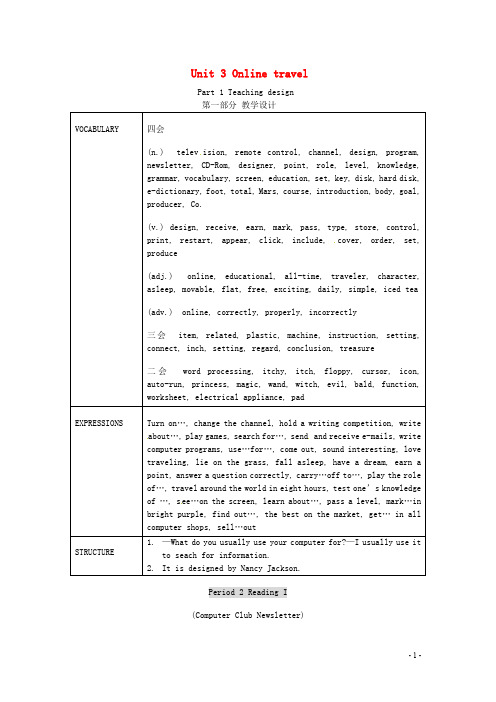
Unit 3 Online travelPart 1 Teaching design第一部分教学设计about…, sendee…on the screen, learn about…, pass a level, mark…inPeriod 2 Reading I(Computer Club Newsletter)Teaching goals●To understand the aim of an educational CD-ROM and what the character cando●To infer meaning from keywords, context and exi sting knowledge●To identify true or false statements based on the reading passage●To identify specific details by completing a conversationTeaching proceduresStep 1 Having a revisionA: What do you usually use your computer for?B: I usually use it to look for information online.A: Why?B: Because I have to write lots of articles.A: How often do you use your computer to email?B: Once a week.Step 2 Presenting—Do you often use your computer to play computer games?—Do you have any CD-ROMs? What are they?—Do you have any CD-ROMs that are good for your study? /that are connected with education?We can call them educational CD-ROMs.(Show students an educational CD-ROM.)You can travel around the world in eight hours, can you imagine?I have a new educational CD-ROM called ‘Around the world in Eight Hours’.It sounds interesting, doesn’t it?First, let me introduce it to you. It’s designed by Nancy Jackson. It can help you learn English and geography at the same time. The main character of it is Itchy Feet.How to play it?Step 3 Reading the text and underlining the expressionsRead the passage, and try to get its main idea. Guess the meaning of the words, finishing Part B on page 44.Read the passage again to underline all the useful expressions, and write them down in Expressions Book.time, beaStep 4 Listening and readingRead aloud the text to the tape, and then tell if the sentences in Part C1 on page 44 are true or false.Step 5 Having a detailed study of the passages1. Some information about ‘Around the world in Eight Hours’a new educational CD-ROMhelp learn English and geography at the same timebe designed by Nancy Jacksonhas 8 level2. The introduction of th e gamemain characterYou get a point every time you answer a qu estion correctly.When you get enough points, a cloud will carry you off toa place you have never visited.The place you have visited are marked in bright purple.3. How to play the game?play the role of the Itchy Feeteight level —It takes an hour to fin ish each level.learn English by testing your knowledge of English grammar and vocabularypass a level, see a world mapthe place you have visited are marked in bright purple.Step 6 Working for consolidationRead the passage, and then try to finish the profile.Step 7 Doing homeworka. Read after the tape five times. Your parent’s signature is needed.b. Remember all the words and phrases and make sentences of your own with them.。
八年级英语下册《Unit 3 Online travel》Period 2 Reading(1)教案 牛津版
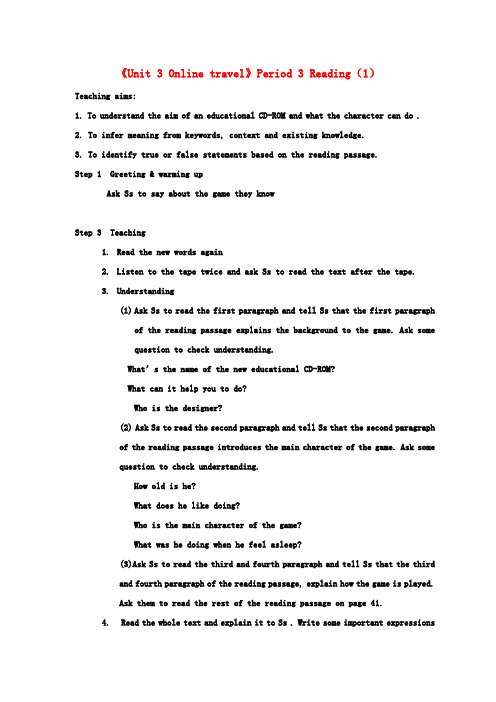
《Unit 3 Online travel》Period 3 Reading(1)Teaching aims:1. To understand the aim of an educational CD-ROM and what the character can do .2. To infer meaning from keywords, context and existing knowledge.3. To identify true or false statements based on the reading passage.Step 1 Greeting & warming upAsk Ss to say about the game they knowStep 3 Teaching1.Read the new words again2.Listen to the tape twice and ask Ss to read the text after the tape.3.Understanding(1)Ask Ss to read the first paragraph and tell Ss that the first paragraphof the reading passage explains the background to the game. Ask somequestion to check understanding.What’s the name of the new educational CD-ROM?What can it help you to do?Who is the designer?(2) Ask Ss to read the second paragraph and tell Ss that the second paragraphof the reading passage introduces the main character of the game. Ask somequestion to check understanding.How old is he?What does he like doing?Who is the main character of the game?What was he doing when he feel asleep?(3)Ask Ss to read the third and fourth paragraph and tell Ss that the thirdand fourth paragraph of the reading passage, explain how the game is played.Ask them to read the rest of the reading passage on page 41.4. Read the whole text and explain it to Ss . Write some important expressionsonto the blackboard.。
Unit;3;Online;travel1

Unit;3;Online;travelunit 3 online travel一、教学内容:unit 3 online travelgrammar二. 教学目标:驾驭unit3的词法构造和用法:passive voice1. 被动语态构造:be + 动词的过去分词。
2. 重点驾驭以下6种状况的被动语态:①一般此时此刻时的被动语态(am/is/are +过去分词)②一般过去时的被动语态(was/were +过去分词)③一般将来时的被动语态(will be +过去分词)/(am/is/are going to be +过去分词)④此时此刻进展时的被动语态(am/is/are being +过去分词)⑤此时此刻完成时的被动语态(have/has been +过去分词)⑥含有情态动词的被动语态(情态动词+be+过去分词)3. 重点驾驭两种特别状况的被动语态①含有使役动词、感官动词和help后接不带to 的动词不定式改为被动语态时要加上to。
②双宾语的状况改为被动语态时有两种改法。
4. 特殊留意happen(take place)及系动词feel, sound, taste, smell, look等没有被动语态的状况。
经典讲解:被动语态英语中的语态(voice)英语中有两种语态:主动语态和被动语态。
1)主动语态(active voice)表示主语是动作的发出者、执行者. many people speak english.主语many people 发出、执行了speak的动作2)被动语态(passive voice)表示主语是动作的承受者,即行为动作的承受者。
english is spoken by many people.主语english是动词speak的承受者。
被动语态的构成被动语态由“be+及物动词的过去分词”构成。
人称、数和时态的改变是通过be动词的改变表现出来的。
现以teach为例说明被动语态在各种时态中的构成。
Unit3;Online;travel导学案
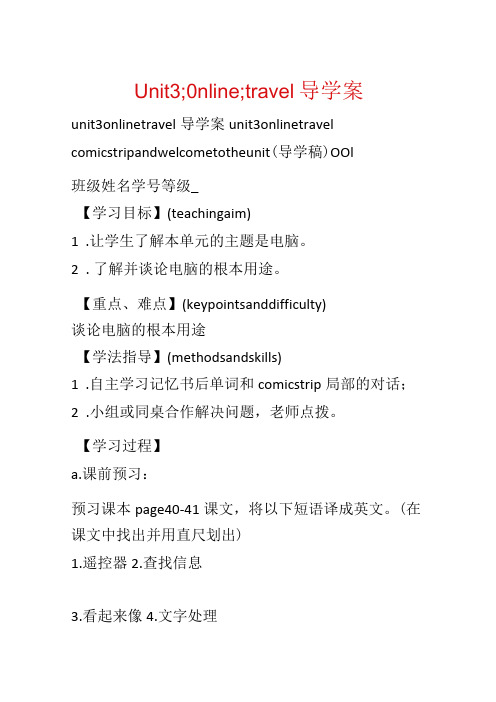
Unit3;0nline;travel导学案unit3onlinetravel导学案unit3onlinetravel comicstripandwelcometotheunit(导学稿)OOl班级姓名学号等级_【学习目标】(teachingaim)1.让学生了解本单元的主题是电脑。
2.了解并谈论电脑的根本用途。
【重点、难点】(keypointsanddifficulty)谈论电脑的根本用途【学法指导】(methodsandskills)1.自主学习记忆书后单词和comicstrip局部的对话;2.小组或同桌合作解决问题,老师点拨。
【学习过程】a.课前预习:预习课本page40-41课文,将以下短语译成英文。
(在课文中找出并用直尺划出)1.遥控器2.查找信息3.看起来像4.文字处理5.翻开电视6.发送电子邮件________________________7.换频道8编程序9玩游戏10举办作文竞赛________________________b.课堂探究1.学生自主探讨以下问题1).whatdoyouusuallydowhenyouarefree?2).doyouhaveacomputerathome?3).doyoulikeplayingcomputergames?4).doyouonlyuseyourcomputertoplaygames?5).whatdoyouuseyourcomputerfor?6).why?7).howoftendoyouuseyourcomputerto...?8).doyouknowanyotherusesofcomputers?2.独立完成课本41页a局部的练习3.小组核对答案4.组内读课本40页对话并回答下列问题1).doeddieandhoboknowwellaboutcomputers?2).whatdoeddieandhobothinkthecomputerlooklike?3).doyouknowwhattheremotecontrolreallyis?5.小组核对答案c.小组展示1.组内自主表演对话2.学生两人一组上台表演对话,他组点评。
- 1、下载文档前请自行甄别文档内容的完整性,平台不提供额外的编辑、内容补充、找答案等附加服务。
- 2、"仅部分预览"的文档,不可在线预览部分如存在完整性等问题,可反馈申请退款(可完整预览的文档不适用该条件!)。
- 3、如文档侵犯您的权益,请联系客服反馈,我们会尽快为您处理(人工客服工作时间:9:00-18:30)。
Unit 3 Online travel一、重点词汇remote, control, design, process, program, educational, all-time, overview,traveller, main, character, dream, earn, role, level, knowledge, mark, available,memo,'y, set, daily, course, topic, regard, mind, appear, simple二、重点短语search for, come out, at the same time,fall asleep,have a dream, come down ,for example三、重点句型1. I have no idea.2. 1 usually use it to search for information.3. One day he was lying on the grass and looking at the beautiful sky when he fell asleep.4. You earn a point every, time you answer a question COITectly.5. When you have earned enough points,a cloud will come down and carry you to a place you have never visited before.6. For example, when you reach London, you will learn about the Museum of kondon and many other interesting things.7. Ge' it now before all the copies are sold out.四、课文讲解1.I have no idea.我不知道。
have no idea是“不知道,不了解”的意思,后面可接of短语或从句。
I have no idea of his address.我不知道他的地址。
I have no idea what it means.我不知道它的含意。
You have no idea how worried I was.你想像不到我是多么担心。
2.I usually use n to search for information.我通常用它采查找信息(1)search for是“寻找,查找”,其后的名词是要找的对象(look thououghly or carefully for)。
The police are searching for the man.警察正在寻找这个人。
They tried to search for the village in the map. 他们在地图上查找这个村庄。
(2)search sth与search...for sth.意思不同。
search作为及物动词表示“搜查,搜索”(to look through a place or aperson thoroughly or carefully to即to find sth.)。
后接“人”的名词表示“搜身”;后接“地点”名词,表示“在某地搜查……”。
The police are searching the man.警察正在搜这个人的身。
Let's search the house to see if the thief hid in it.让我们将这房子搜一遍,看看小偷是否藏在里面。
(3)search sb.or a place for表示“搜某人或某个地点以便找到……”。
She searched her pockets for a cigarette.她把自己口袋找遍了,想找一根香烟。
The police searched the woods for the lost child.警察搜索树林寻找失踪的孩子。
3.A new educationed CD-ROM called‘Around the World in Eight Hours’has just come out.一个称之为《八小时环游地球》的教育光盘刚刚发行了。
(1)句中的called是过去分词作后置定语,具有被动含义,相当于which is called...的定语从句,意思是“名叫…”。
He is reading the book called My Home,Fown.他正在读一本名叫《故乡》的书。
Do you know the man called ZhangHua ? 你认识那位叫张华的人吗?(2)come out有“出版”“发行”“有结果”“为人所知”“开花”等多种含义,为不及物动词短语。
When did the book come out? 这书什么时候出版的?The truth has come out at last.真相终于大白。
The news came out that the President was yew sick.有消息说总统病重。
Who came out first in the contest? 比赛谁得了第一名?I think the roses will come out nex tweek。
我看玫瑰下星期就要开花。
4.This CD-ROM can help you learn English and Geography at the same time.这种光盘可以帮助你同时学习英语和地理。
at the same time有两个主要意思。
(1)同时The two runners reached the finishing line at the same time.两个赛跑者同时到达终点线。
The two students stood up at the same time.两个学生同时站了起来.(2)表示转折,意为“然而,但(yet)”。
This is a difficult problem,at the same time it is very interesting.这是一个困难的问题,但也是个很有趣的问题。
5.He is a thirteen-year-old boy who loves travelling.他是一个爱好旅游的十三岁的男孩。
(1)thirteen-year-old是——个由“数词+名词+形容词”构成的合成词,作定语,这种问须用连字符连接,名词用单数,只作前置定语。
Yesterday I wrote an eight-hundred-word letter to my teacher.昨天我写了一封800词的信给我的老师。
当“数词+名词+形容词”作后置定语或表语时,不用连宁符连接,名同要用复数。
He lives in the room twelve feet wide and fifteen feet long.他住在十二英尺宽、十五英尺长的房间里。
The girl is eight years old.那女孩有八岁了。
(2)who loves travelling是定语从句,作boy的定语,who是关系代词,用以指代被修饰的名词lmy,并在从句中充当主语。
This the doctor who saved the boy’s life.这就是挽救了这个男孩的医生。
The man who has just left is my neighbour.刚走的那个人是我的邻居。
Do you know the man who spoke just now? 刚才发言的那个人你认识吗?The teacher who teaches us Englisll is a young woman.教我们英语的老师是一位年轻的女人。
6.One day,he was lying on the grass and looking at the beautiful sky when he fell asleep.一天,他躺在草地上望着美丽的天空,然后睡着了。
(1)在本句中,when是并列连词,表示“就在这时”,相当于and just at the time/and then。
它常与过去进行时连用或与be about to搭配。
I was doing my homework when he came in. 我正在做作业,这时他进来了。
An Arab was travelling along the desert When he met two men.一个阿拉伯人在沙漠中行走着.这时他碰见了两个人。
I was about to go out when the telephone rang. 我正要出去。
这时电话铃响了。
The woman was about to open the door when she heard a strange sound from inside.那位妇女正要开门,这时她听见里面有奇怪的响声。
(2)fall asleep作“入睡”解,fall是连系动词。
如fall ill (生病),fall silent (沉默)等。
注意下列表示“睡觉”的短语用法不同:go to bed上床睡觉,就寝(指上床睡觉的动作,不表示睡着)go to sleepget to sleep 入睡,睡着(指进入梦乡的过程)fall asleepbe asleep熟睡(指睡眠的状态)试比较:He goes to bed at ten every night. 每晚他十点钟上床睡觉。
I don't know when I went to sleep(go to sleep,fell asleep)last night.我不知道我昨晚什么时候睡着的。
The baby is fast asleep. 孩子睡得很香。
7.You earn a point every time you answer a question correctly.每当你正确地回答一个问题时,你就赢得1分。
every time在此作为连词词组,引导—个时间状语从句,表示“每当”every time,each time(每当),the first time/(the)next time/.../the last time(第一次,下次,……,最后一次)均可用作连词,引导时间状语从句。
